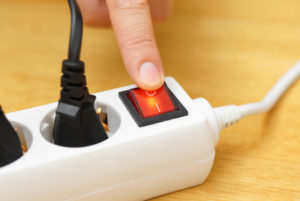How Much Does It Cost To Leave A Computer On? And Should You…?
I wind up answering a lot of questions about technology. One of the most common questions – Should I turn my computer off at night? My standard answer has always been no. Let’s learn together…
Should a computer be turned off at night?
Computer technology and components are constantly improving. In the days of traditional hard drives with spinning components, the simple answer was “leave it on all the time.” But components and operating systems have improved! Many computers have solid state drives that do away with moving parts. The quality and durability of all hard drives has improved.
If your computer is used for just an hour or two every day, it is probably best to turn it off when not in use. (Of course you need to use the proper shut down procedure for your system.) If your computer is in use all throughout the day and night, or you don’t want to wait for system startup, you should probably leave it on. But how much does it cost to leave it on?
 How much does it cost to leave a computer on?
How much does it cost to leave a computer on?
There will be HUGE variance in this number depending on the age, style, and efficiency of your system. We are an Apple family with a MacBook Pro laptop and a Mac Mini ‘desktop’ computer in the living area of our house. Apple makes some of the most energy efficient systems on the market.
Cost estimates will be based on our average price per kWh – $0.074 (that includes taxes and fees)
Here are some numbers for our 2011 MacBook Pro laptop:
- .03 watts – Power supply plugged into wall but not laptop
- 1.14 watts – Laptop plugged in and in sleep mode / not charging
- 35 watts – Laptop average during usage
- 60 watts – Laptop charging
I used a power monitoring device to find that our laptop used 398.24 watts on an average day of usage. Based on this it costs $0.03 per day, $0.90 per month, and $10.76 per year to operate that laptop. Obviously there is going to be a lot of variance in that number.
Our Mac Mini consumed 80 watts while active and dropped to around 15 watts while sleeping. My tracking device found that it cost around $0.065 per day, $1.98 per month, and $23.78 per year. (This number is for the computer only, does not include the display the computer is attached to.)
What if you’re in a PC household? I do have a PC desktop out in the shop for my eBay business. It is a small form computer made by Logic Supply. I found it was consuming an average of 150 watts since I have it set to not sleep or hibernate. That computer is costing $0.27 a day, $8.10 a month, and $97.30 a year if it is on 24/7/365. (Again, this is computer only – does not include display, laser printer, or label printer.)
Should I turn my computer off?
The PC is the easiest example for savings. I’m guessing that computer is used 2 hours per day on average. If that computer was turned on only for those hours, power costs would drop from $97.30 a year to $8.11! I did some quick guess work on costs for the monitor, laser printer, and label printer and limiting those devices to 2 hours would save an additional $40 per year. That’s approximately $130 of savings in a year for turning off one cluster of devices when not in use.
In almost all cases, a laptop consumes less electricity than a desktop computer.
When you turn a computer on there is a surge of power that can cause additional wear on computer components. However, constant run time causes a different kind of stress. Next time I am asked about turning the computer off at night…I will probably say it is a good idea. Obviously this depends on your system, the hours of usage, and your patience in waiting for your computer to start up.
Was there anything surprising or interesting in this post? I’d love to hear your questions or thoughts in the comments section below…


“I used a power monitoring device to find that our laptop used 398.24 watts on an average day of usage.” “Average day” I presume means you did this several days. You are an amazing geek! I love it!
You are correct! I was using a wifi controlled plug that also keeps track of energy usage. I’m glad someone else appreciates my uber geek status!